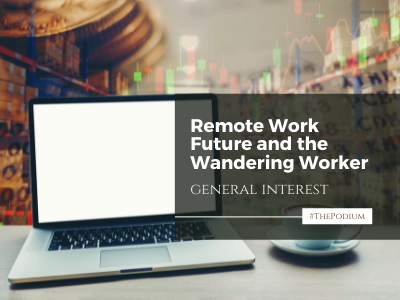
The Good The Bad & the Ugly: Ron Peters of Littler Mendelson Talks About the “Wandering Worker” at the August LPI Conference
On August 28, 2021, the CEC proudly hosted its first live seminar in Santa Clara since February, 2020. Ronald Peters, Esq. of Little Mendelson presented “The Good, The Bad and the Ugly,” addressing the most recent laws governing the past, current and future working conditions hugely affected by the Covid-19 pandemic, whether those conditions include working remotely, working at the office, or in a hybrid situation.
HISTORY
Working remotely is not new. Technological advances had already allowed more and more workers to either work remotely from home or other locations prior to the Covid-19 pandemic. The pandemic just accelerated the process of transitioning to a more remote workforce since it was one of the best options for companies to continue doing business while keeping employees safe from being exposed to the Covid-19 virus. After employers were forced to go into this situation, many found that it actually worked and there were some benefits gained on both sides. Companies don’t have to pay the high cost of real estate in the big cities while many workers enjoy an easier commute.
Mr. Peters is one of the attorneys in a workgroup of attorneys created by Littler Mendelson who specialize in the legal outcomes of the remote worker, also referred to as the “wandering worker.” This group answers many troubling questions through blogs, articles and speaking engagements, which can be found on the Littler Mendelson website. The issues that constantly arise from a remote workforce are addressed and the most recent laws that govern those issues are being identified.
TODAY
Many of the hot issues on today’s agenda of the “wandering worker” are employee productivity, workers’ compensation, vaccination policies, taxation, wage and hour, and jurisdictional challenges when an employee is working in a different state rather than the state the employer is located.
TODAY’S COMMON QUESTIONS
Can employers mandate that their employees be vaccinated?
- In many states, including California, an employer can terminate their employees for any reason, as long as the termination is not illegal. An illegal termination is when the employee is in a protected category such as having a medical condition or practicing a religion that prevents the worker from getting the vaccine. However, that also needs to be proven by the employee. Though it is not always very easy for the employee to prove, terminating people who refuse to get vaccinated can also be tricky.
If an employee is exposed to Covid-19 in the workplace, is the employer liable?
- At the very beginning of the shelter-in-place orders, this presumption was originally in place when only essential workers were in the workforce. Therefore, it was presumed that they did not catch the virus anywhere else. Now that many people have returned to work, and businesses have reopened, if a worker contracts Covid-19, it is not presumed that they were exposed at work, since the exposure could have been in a variety of locations outside of the workplace, including the supermarket, a restaurant, the gas station, or from someone else living in the household. Therefore, the burden of proof is on the employee. If the employee can prove that the exposure was at the workplace, only then will the employer be liable. The employee might have a workers’ compensation claim, but only if the person gets sick.
Are employees able to now demand to work from home?
- Employers don’t have to allow employees to work from home, but it was the only way that they could keep employees safe, especially prior to the vaccine and during times when hand sanitizer and masks were scarce. Employees don’t have the independent right to say that they would rather work at home. If employees do come into the office, employers do need to make sure that they follow all guidelines and laws currently passed by Cal-OSHA. For example, enforcing face coverings and assessing potential areas that might be considered hazardous such as common places where employees congregate. [1]
If a company is located in California, but the employee moved to Texas, which law does the employer need to follow?
- Most laws follow the employee, but that is not always. States usually have an interest in protecting their own residents. The most prudent thing for both employer and employee is to be familiar with the laws in both states.
FUTURE
Many employers can now allow their employees to return to the office if the employee is fully vaccinated, and if not, can require the unvaccinated employee to be tested weekly and return upon weekly negative Covid-19 results.
Now that President Biden has proposed new vaccine mandates for private companies of over 100 employees, will the government become more involved in controlling who is vaccinated? Public employers such as the U.S. Government have already required employees to be vaccinated, but the government does not have the same control over private companies. The answer is in the future, but this proposal will most likely be challenged by the restrictions of government listed in the Constitution. This is something that we will need to watch play out in the government process.
On the other hand, since both employers and employees have both found benefits from the remote workforce, perhaps the “wandering worker” is not going anywhere at this time.
[1] https://www.littler.com/publication-press/publication/california-standards-board-passes-sweeping-calosha-emergency-covid-19
Categorized in: General
| << previous | next >> |








